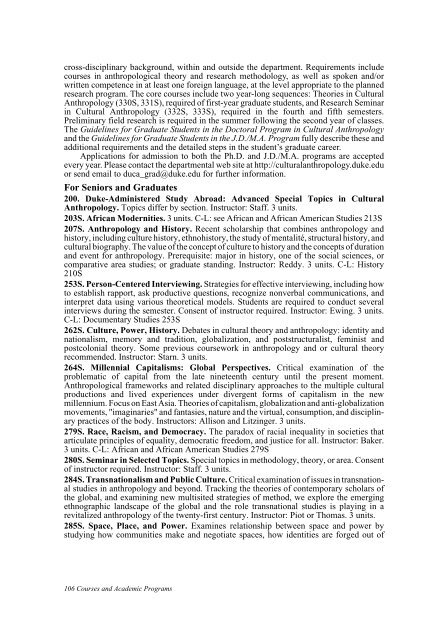2005-06 - Office of the Registrar - Duke University
2005-06 - Office of the Registrar - Duke University
2005-06 - Office of the Registrar - Duke University
Create successful ePaper yourself
Turn your PDF publications into a flip-book with our unique Google optimized e-Paper software.
cross-disciplinary background, within and outside <strong>the</strong> department. Requirements include<br />
courses in anthropological <strong>the</strong>ory and research methodology, as well as spoken and/or<br />
written competence in at least one foreign language, at <strong>the</strong> level appropriate to <strong>the</strong> planned<br />
research program. The core courses include two year-long sequences: Theories in Cultural<br />
Anthropology (330S, 331S), required <strong>of</strong> first-year graduate students, and Research Seminar<br />
in Cultural Anthropology (332S, 333S), required in <strong>the</strong> fourth and fifth semesters.<br />
Preliminary field research is required in <strong>the</strong> summer following <strong>the</strong> second year <strong>of</strong> classes.<br />
The Guidelines for Graduate Students in <strong>the</strong> Doctoral Program in Cultural Anthropology<br />
and <strong>the</strong> Guidelines for Graduate Students in <strong>the</strong> J.D./M.A. Program fully describe <strong>the</strong>se and<br />
additional requirements and <strong>the</strong> detailed steps in <strong>the</strong> student’s graduate career.<br />
Applications for admission to both <strong>the</strong> Ph.D. and J.D./M.A. programs are accepted<br />
every year. Please contact <strong>the</strong> departmental web site at http://culturalanthropology.duke.edu<br />
or send email to duca_grad@duke.edu for fur<strong>the</strong>r information.<br />
For Seniors and Graduates<br />
200. <strong>Duke</strong>-Administered Study Abroad: Advanced Special Topics in Cultural<br />
Anthropology. Topics differ by section. Instructor: Staff. 3 units.<br />
203S. African Modernities. 3 units. C-L: see African and African American Studies 213S<br />
207S. Anthropology and History. Recent scholarship that combines anthropology and<br />
history, including culture history, ethnohistory, <strong>the</strong> study <strong>of</strong> mentalité, structural history, and<br />
cultural biography. The value <strong>of</strong> <strong>the</strong> concept <strong>of</strong> culture to history and <strong>the</strong> concepts <strong>of</strong> duration<br />
and event for anthropology. Prerequisite: major in history, one <strong>of</strong> <strong>the</strong> social sciences, or<br />
comparative area studies; or graduate standing. Instructor: Reddy. 3 units. C-L: History<br />
210S<br />
253S. Person-Centered Interviewing. Strategies for effective interviewing, including how<br />
to establish rapport, ask productive questions, recognize nonverbal communications, and<br />
interpret data using various <strong>the</strong>oretical models. Students are required to conduct several<br />
interviews during <strong>the</strong> semester. Consent <strong>of</strong> instructor required. Instructor: Ewing. 3 units.<br />
C-L: Documentary Studies 253S<br />
262S. Culture, Power, History. Debates in cultural <strong>the</strong>ory and anthropology: identity and<br />
nationalism, memory and tradition, globalization, and poststructuralist, feminist and<br />
postcolonial <strong>the</strong>ory. Some previous coursework in anthropology and or cultural <strong>the</strong>ory<br />
recommended. Instructor: Starn. 3 units.<br />
264S. Millennial Capitalisms: Global Perspectives. Critical examination <strong>of</strong> <strong>the</strong><br />
problematic <strong>of</strong> capital from <strong>the</strong> late nineteenth century until <strong>the</strong> present moment.<br />
Anthropological frameworks and related disciplinary approaches to <strong>the</strong> multiple cultural<br />
productions and lived experiences under divergent forms <strong>of</strong> capitalism in <strong>the</strong> new<br />
millennium. Focus on East Asia. Theories <strong>of</strong> capitalism, globalization and anti-globalization<br />
movements, "imaginaries" and fantasies, nature and <strong>the</strong> virtual, consumption, and disciplinary<br />
practices <strong>of</strong> <strong>the</strong> body. Instructors: Allison and Litzinger. 3 units.<br />
279S. Race, Racism, and Democracy. The paradox <strong>of</strong> racial inequality in societies that<br />
articulate principles <strong>of</strong> equality, democratic freedom, and justice for all. Instructor: Baker.<br />
3 units. C-L: African and African American Studies 279S<br />
280S. Seminar in Selected Topics. Special topics in methodology, <strong>the</strong>ory, or area. Consent<br />
<strong>of</strong> instructor required. Instructor: Staff. 3 units.<br />
284S. Transnationalism and Public Culture. Critical examination <strong>of</strong> issues in transnational<br />
studies in anthropology and beyond. Tracking <strong>the</strong> <strong>the</strong>ories <strong>of</strong> contemporary scholars <strong>of</strong><br />
<strong>the</strong> global, and examining new multisited strategies <strong>of</strong> method, we explore <strong>the</strong> emerging<br />
ethnographic landscape <strong>of</strong> <strong>the</strong> global and <strong>the</strong> role transnational studies is playing in a<br />
revitalized anthropology <strong>of</strong> <strong>the</strong> twenty-first century. Instructor: Piot or Thomas. 3 units.<br />
285S. Space, Place, and Power. Examines relationship between space and power by<br />
studying how communities make and negotiate spaces, how identities are forged out <strong>of</strong><br />
1<strong>06</strong> Courses and Academic Programs









